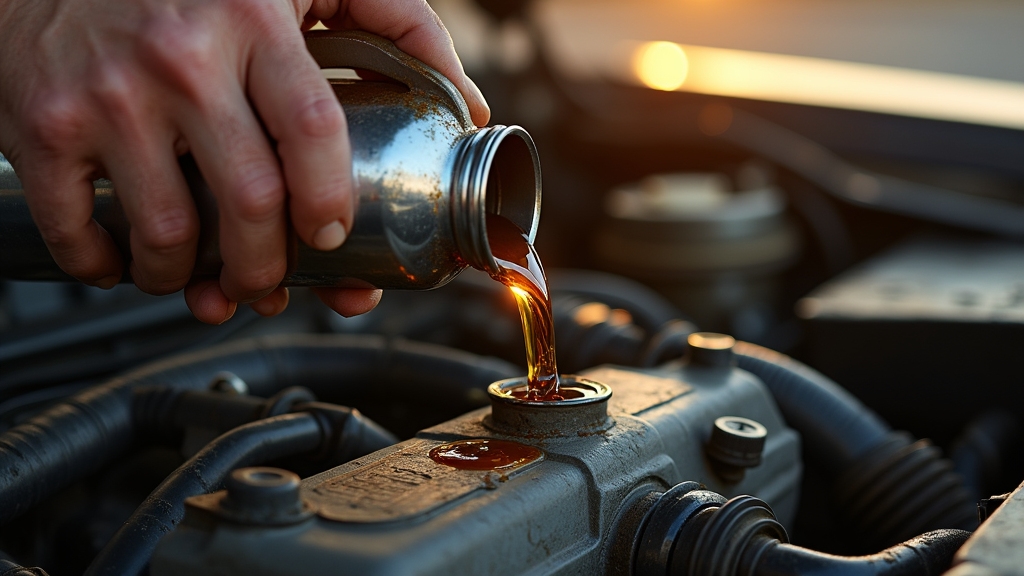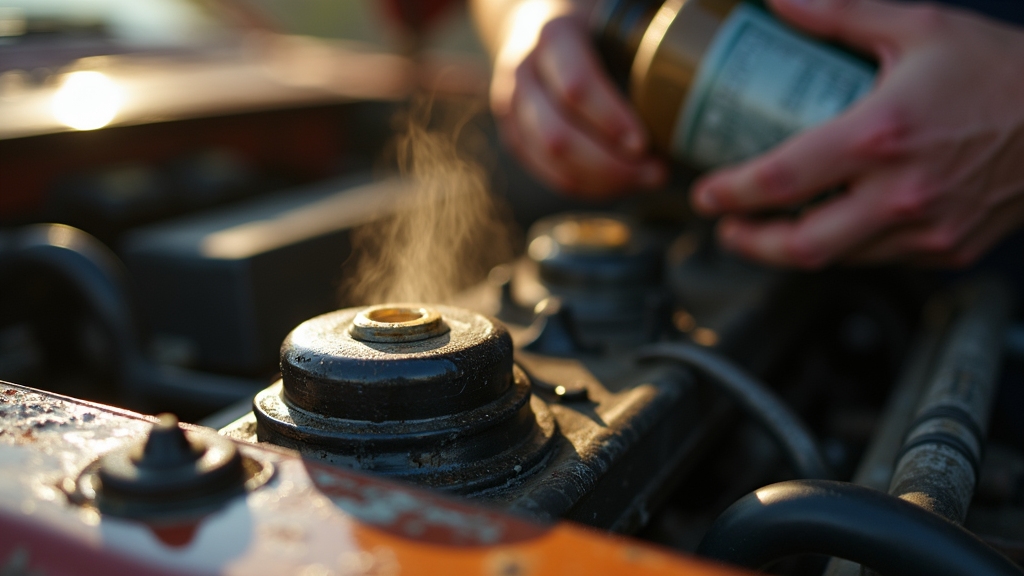Physical Address
304 North Cardinal St.
Dorchester Center, MA 02124
Physical Address
304 North Cardinal St.
Dorchester Center, MA 02124

If your vehicle has over 75,000 miles and you notice increased oil consumption, leaks, or engine knocking, high mileage oil can help restore seal flexibility, reduce sludge, and minimize wear.
It contains specialized additives like seal conditioners and detergents to protect aging engines and improve performance. While not necessary for all cars, switching at the right time can extend engine life and efficiency.
To understand how these oils work and when to choose them, explore further details.
Although many oils serve general engine needs, high mileage oil is specifically formulated for vehicles with 75,000 miles or more to address common issues in aging engines.
You’ll find it designed to reduce oil consumption, smoke, and emissions, which tend to increase as seals and gaskets deteriorate.
This oil also contains ingredients that help minimize leaks and seepage, maintaining engine performance by counteracting wear and tear. It is important to consider the viscosity rating to ensure optimal engine protection at various temperatures.
It’s not necessary for vehicles with fewer miles since those issues are less prevalent. By using high mileage oil, you help your engine combat sludge buildup and internal friction, which supports smoother operation and prolongs engine life.
Keep in mind, this oil type targets normal aging symptoms rather than major mechanical failures, so it’s best for well-maintained vehicles showing early signs of wear.
Many drivers notice benefits such as reduced oil leaks and quieter engine operation due to the seal conditioners that rejuvenate aging engine seals.
High mileage oil contains some pretty neat additives that really make a difference! For starters, you’ll find seal conditioners in there.
These little guys help restore flexibility to those hardened engine seals, which can really reduce leaks that are often a problem in older vehicles. It’s like giving your engine a little TLC! Using the right oil with protective additives can extend the lifespan of your engine components.
But that’s not all. There are also detergents in high mileage oil that work to keep sludge buildup at bay. Nobody wants a gunky engine, right? These detergents often include magnesium sulfonates, which help neutralize impurities and keep engine parts clean.
Plus, anti-wear additives like ZDDP come into play, forming protective films on metal surfaces. This helps to minimize friction and wear—no one wants their engine wearing out too soon!
When you maintain a high-mileage engine, seal conditioners play an essential role in preserving the integrity of rubber seals and gaskets. These additives penetrate hardened seals, restoring elasticity and flexibility to prevent leaks caused by age-related shrinkage and cracking.
By forming a protective film, they maintain proper sealing pressure and reduce friction between engine parts. Seal conditioners typically include silicone compounds, esters, antioxidants, and moisturizing agents designed to rejuvenate deteriorated seals.
Additionally, these additives help restore engine performance by reducing timing chain wear and improving overall engine function. Key benefits you can expect from seal conditioners in high mileage oil include:
Seal conditioners help maintain the integrity of aging seals, but keeping your engine clean and protected from wear requires addressing additional challenges. Filters with anti-drainback valves aid in maintaining oil pressure and cleanliness, which complements the function of high mileage oils.
High mileage oils contain enhanced detergents that prevent sludge buildup by suspending contaminants, ensuring oil passages remain clear. They also include anti-wear additives like ZDDP, which form protective films on metal surfaces to reduce friction and wear, especially during cold starts and high-load conditions.
These oils often contain specialized additive packages designed to fill microscopic valleys on metal surfaces, reducing asperities and minimizing wear through improved surface interaction (additive packages).
| Additive Type | Function | Benefit in High Mileage Engines |
|---|---|---|
| Detergents | Suspend contaminants | Prevent sludge, maintain oil flow |
| Anti-Wear | Form protective metal films | Reduce friction, preserve engine torque |
| Synergistic Action | Balance cleaning & protection | Extend engine life, improve performance |
| Deposit Control | Inhibit varnish formation | Ensure consistent anti-wear additive efficacy |

Although older engines face unique challenges, using high mileage oil can substantially enhance their performance and longevity. This specialized oil addresses common wear and tear issues found in engines with 75,000+ miles by combining advanced additives that restore seals, reduce oil consumption, and prevent sludge buildup.
Choosing the correct oil viscosity is crucial, as viscosity modifiers ensure optimal engine protection. When you choose high mileage oil, you benefit from:
High mileage oils are specifically designed for engines with over 75,000 miles, making them ideal for older vehicles.
Using high mileage oil helps maintain engine efficiency, reduces maintenance costs, and extends the engine’s operational life.
If your vehicle has surpassed 75,000 miles, you should monitor specific indicators that suggest it might benefit from switching to high mileage oil.
Increased oil consumption requiring frequent top-ups or visible leaks under the engine often point to worn seals and piston rings.
Listen for ticking or knocking noises at startup or under load, as these signal lubrication issues or engine wear.
Notice any decline in acceleration, power, or fuel economy, which may reflect internal friction.
Check the oil’s condition on the dipstick—dark, thick, or sludge-laden oil indicates degradation and reduced lubrication efficiency.
Dashboard warnings like oil pressure or check engine lights, along with blue exhaust smoke, also suggest the engine is aging.
Additionally, high mileage oil contains seal conditioners that help prevent oil leaks and protect aging engine components.

Once your vehicle hits around 75,000 to 100,000 miles, it might be time to think about switching to high mileage oil. Many high mileage oils come with advanced additive technology that helps improve engine efficiency and reduce wear.
Have you noticed anything unusual, like increased oil consumption or leaks? Those could be signs of engine wear.
And don’t forget about the maintenance history of your vehicle! If it’s been inconsistent, you might need to consider specialized oil formulations even sooner.
High mileage oils contain additives like seal conditioners that help reduce leaks and oil consumption in aging engines.
Taking all these factors into account can really help ensure that your engine stays protected and performs well as it ages. It’s all about keeping your ride in the best shape possible!
When your vehicle approaches 75,000 miles, it’s generally the right time to contemplate switching to high mileage oil to address wear-related engine needs. Monitoring oil condition and engine wear factors can provide additional insight into timing this change.
However, mileage alone isn’t the sole factor; consider your driving conditions, vehicle age, and maintenance history. High mileage oil is designed to support older engines by improving seal integrity and reducing oil consumption.
Keep these thresholds in mind:
The decision should be based on engine condition, not just the odometer reading, as worn components and leaks are stronger indicators for switching.
Deciding to switch to high mileage oil involves recognizing specific indicators of engine wear beyond just mileage or age.
You should consider high mileage oils if you hear engine knocking or ticking at startup or acceleration, signaling poor lubrication or worn parts. These oils contain enhanced wear protection additives that help reduce metal-on-metal contact in aging engines.
Frequent oil top-ups or visible leaks indicate deteriorated seals and piston rings; high mileage oils contain seal conditioners to mitigate these issues.
Sludge buildup, observed as thick, black deposits on the dipstick, impairs lubrication and necessitates oils with stronger detergents. Using oils that meet API SN/SM/SP standards can provide better sludge control and engine cleanliness.
Additionally, if you notice reduced engine power, rough operation, or decreased fuel economy, internal wear is likely increasing friction.
Visually inspecting oil for dark color, thickness, or contaminants helps detect degradation early.
Switching to high mileage oil at these signs can protect and restore engine function effectively.
Engines with high mileage often experience loss of engine power, especially on steep slopes, which can be improved by using high mileage oil.
How do mileage and maintenance history influence the ideal time to switch to high mileage oil? Generally, vehicles with 75,000 to 100,000 miles benefit most from switching.
However, your engine’s condition and maintenance record are equally critical. Regular oil changes and upkeep can justify an earlier switch, while neglect may necessitate more aggressive formulations. Choosing the right oil also involves understanding the composition and additives to ensure optimal protection.
Consider these points:
Switch near 75,000 miles if maintenance is consistent to proactively reduce wear and improve engine efficiency.
Delay beyond 100,000 miles risks sludge buildup and mechanical wear.
Engines showing increased oil consumption or leaks signal timely switching.
Past repairs or seal replacements impact oil choice and effectiveness.
Well-maintained engines may improve fuel efficiency and extend engine life with high mileage oil.
Monitor your vehicle’s history closely to optimize the timing and benefits of the switch.
Although high mileage oils are marketed with claims of enhanced engine protection, their additive packages differ only slightly from standard oils, primarily in concentration rather than composition.
These additives aim to reduce metal surface asperities by filling microscopic valleys, potentially smoothing engine components. However, proprietary formulas limit transparency, and independent research offers inconclusive evidence on their long-term effectiveness.
Furthermore, the presence of ambiguous and potentially misleading content in marketing materials can contribute to confusion about their true benefits ambiguous claims.
You should know that high mileage formulations often include seal swelling agents, which might cause leaks or damage seals in newer or well-maintained engines. Unlike power steering fluid, which focuses on lubrication and hydraulic assistance, these oils are formulated for engine protection under various conditions.
If your vehicle shows no oil consumption or leaks, switching may provide no tangible benefits and could even harm fuel economy due to increased viscosity.
Ultimately, deciding to use high mileage oil depends on your engine’s condition, driving patterns, and maintenance history rather than mileage alone.
Understanding the compatibility of high mileage oils with synthetic and conventional formulations helps you make informed choices for your engine’s maintenance.
High mileage oils can be based on conventional, synthetic, or blend formulations, each with unique base oil and additive characteristics. Combining oils of the same viscosity grade and API service category is generally safe, but blending different base stocks may dilute performance benefits.
Here are key points to contemplate:
Always match viscosity and manufacturer specifications to ensure optimal protection. Additionally, mixing synthetic with regular oil is considered safe temporarily but may reduce engine protection, so it is best used as a short-term solution.
When you evaluate high mileage oils, expert analyses and real-world feedback reveal distinct advantages tied to their specialized additive formulations.
These oils incorporate seal conditioners, antioxidants, and detergents that address common aging engine issues like seal degradation and sludge buildup.
Independent tests show some synthetic high mileage oils can reduce engine sludge by up to 67%, improving efficiency.
Mechanics highlight how enhanced seal swell agents and anti-wear compounds maintain viscosity and film strength, mitigating compression loss and blow-by.
User reports frequently mention reduced oil consumption and leaks, though effects vary with vehicle condition.
Experts recommend switching after 75,000–100,000 miles or when signs of wear appear, especially for vehicles over 75,000 miles.
While not a cure-all, high mileage oils offer a technically sound option to prolong the life of aging engines without causing harm if API standards are met.
High mileage oil won’t substantially boost your fuel economy directly.
Its primary benefit lies in rejuvenating seals and reducing leaks in older engines, helping maintain consistent engine conditions.
Any fuel savings come mostly from improved engine cleanliness and reduced friction, which are modest.
For noticeable fuel economy gains, focus on using the proper lower-viscosity oil grade recommended by your manufacturer rather than relying solely on high mileage formulations.
You know what they say: an ounce of prevention is worth a pound of cure.
You should change high mileage oil more frequently than regular oil, typically every 3,000 to 5,000 miles.
While synthetic oils extend intervals up to 7,000 miles, high mileage oils protect aging engines but don’t lengthen change intervals.
Stick to shorter intervals to prevent sludge buildup and maintain seal integrity, ensuring your engine stays healthy longer.
No, high mileage oil won’t cause issues if you accidentally use it in a newer engine.
Its seal conditioners might slightly swell seals, but this effect is generally harmless in engines with intact gaskets.
However, you won’t gain any real benefits since newer engines don’t need additives targeting wear or leaks.
Just guarantee you use the correct viscosity and specifications, and stick to your manufacturer’s recommended oil change intervals for ideal performance.
Yes, specific brands like Mobil 1 High Mileage, Valvoline MaxLife, and Castrol GTX High Mileage are highly recommended for engines over 75,000 miles.
Mobil offers full synthetic oils with advanced anti-wear and seal conditioning.
Valvoline balances performance and value with MaxLife technology.
Castrol provides effective detergents and emission system protection.
For premium needs, Royal Purple HMX delivers superior wear resistance and fuel efficiency benefits.
Choose based on your engine’s demands and budget.
You can switch back to regular oil, but imagine your engine seals suddenly deflating like a balloon losing air. That’s how they react to losing seal conditioners in high mileage oil.
This change might cause minor leaks or increased oil consumption as seals adjust. Monitor oil levels closely and be aware that regular oil lacks additives that protect worn engine parts.
If your vehicle has over 75,000 miles, using high mileage oil can reduce leaks and improve engine longevity by up to 30%. This is thanks to specialized seal conditioners and anti-wear additives.
However, evaluate your engine’s condition and oil compatibility before switching. While high mileage oil offers clear benefits for aging engines, it’s not a cure-all. Consult your manual or a professional to ensure it fits your car’s specific needs and driving habits.